Recall the early days of 2011 in Egypt. Following a national uprising unprecedented in scale and intensity, President Hosni Mubarak finally resigns, leaving the government in the hands of a small group of high-ranking military officers designated the Supreme Council of the Armed Forces (SCAF). By the Spring of 2011, the halcyon days of solidarity were fading from collective memory, replaced by the events surrounding an increasingly complicated transition, including the referendum on SCAF’s constitutional amendments; an uptick in violence against Copts; brutal physical repression of demonstrators by the police and army; and the infamous virginity tests. No doubt US officials in Egypt (home to the world’s second largest U.S. embassy compound, after Baghdad) had their hands full investigating claims of human rights violations, liaising with Cairo’s power brokers, vetting prominent dissidents, and drafting cables–all the usual responsibilities of diplomatic staff.
However, the gravitational center of the Egyptian-American alliance lies outside the traditional civilian-diplomatic channels. Decades of US military aid to Egypt have created complex personal and institutional networks linking the US military, American defense firms, and Egypt’s influential military establishment–making these actors the real locus of US-Egypt relations in the early months of the uprising. Indeed, it came as little surprise to many scholars of Egyptian politics that the critical communication channel during the most uncertain days of Mubarak’s equivocating was not an acting member of the US diplomatic staff, but a retired official working at a prominent US law firm whose client list included not only the Egyptian military but a number of US defense contractors that had sold them weapons.[1]
Clearly, it is difficult to overestimate the importance of the US defense industry in shaping the Egyptian-American alliance, and it is a fact that most (if not all) diplomatic missions act on behalf of their nation’s defense industries to promote exports. However, it is rare to stumble across an example of the tools these diplomatic missions use in the course of such duties. Below are the pdf slides of a presentation on the defense market in Egypt prepared by the US Commercial Service.[2] It is date-stamped 15 May 2011–the same day that members of Egypt’s Military Police and Central Security Forces used tear gas, rubber bullets and (by some accounts) live ammunition against demonstrators, ultimately arresting 150 individuals and injuring more than 350.

According to the website of the US Commercial Service, which produced this presentation, the agency is “the trade promotion arm of the US Department of Commerce’s International Trade Administration” where “trade professionals in over 100 US cities and in more than seventy-five countries help US companies get started in exporting or increase sales to new global markets.”
This trade promotion mandate includes educating US firms about export opportunities in Egypt, many of which necessarily fall under the rubric of defense and security exports. But revolutions are typically tricky periods in which to sign new export contracts, since the very identity of government office-holders with the authority to enter into new agreements is unknown. Luckily the next presentation slide demonstrates that the US commercial trade staff is aware there’s a revolution going on:
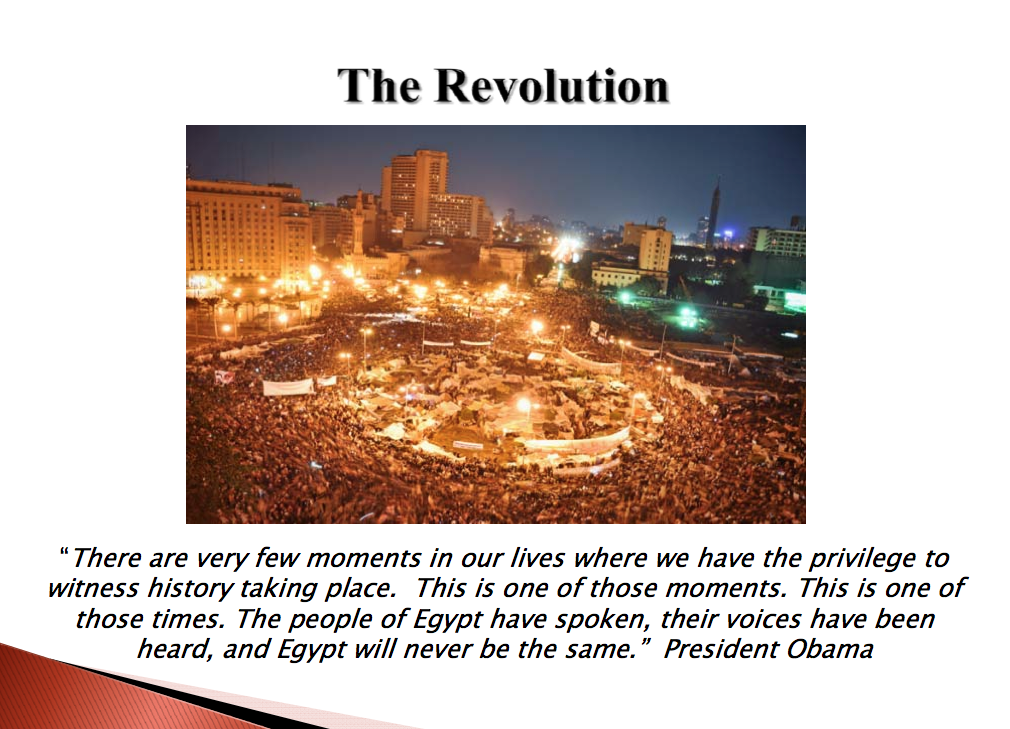
And despite the obvious complications related to ongoing demonstrations, persistent violations of human dignity by unaccountable security forces, and the dramatic deterioration of living standards as Egypt’s economy contracts, these US government functionaries do not see any reason why that should disrupt trade:

In fact, all that internal unrest–combined with Egypt’s weak domestic industrial base–means relevant markets are “booming”:
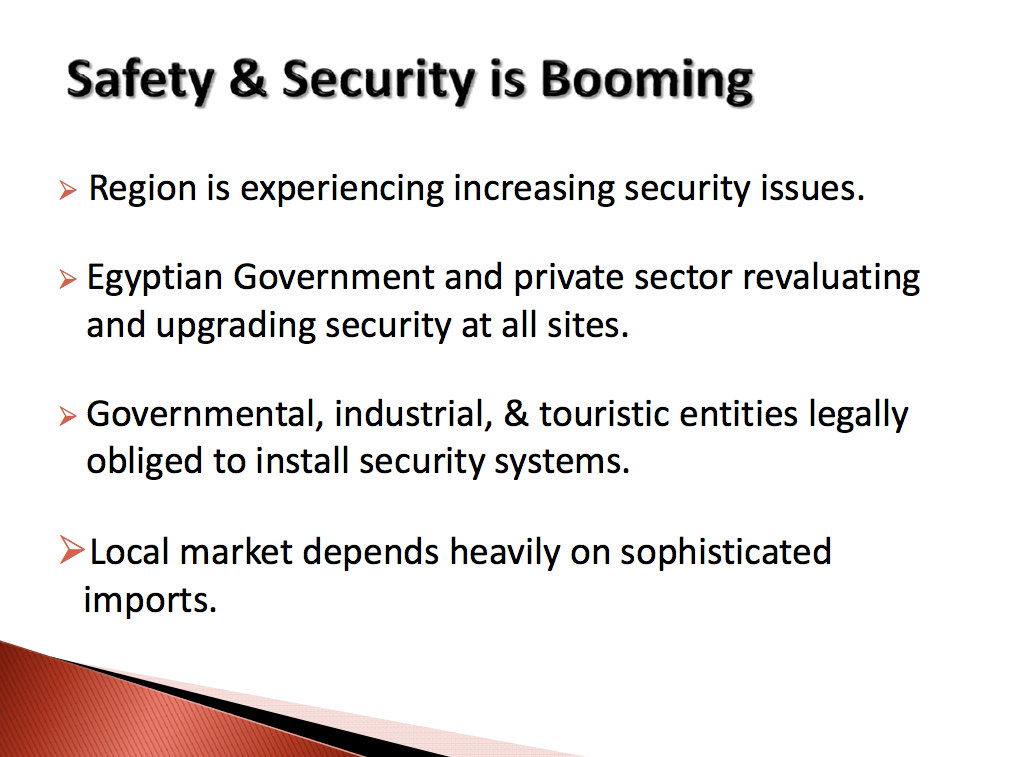
Plus, there are plenty of buyers for what US defense firms are selling:
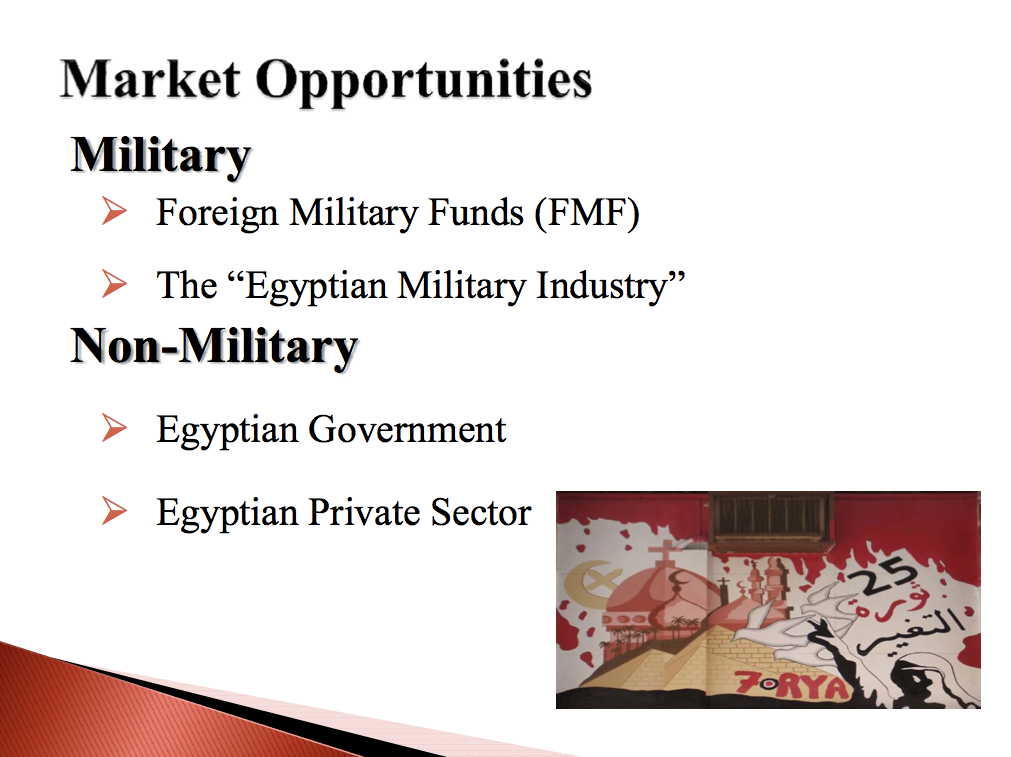
And generations of US policymakers have given American firms a major head start in terms of networking:
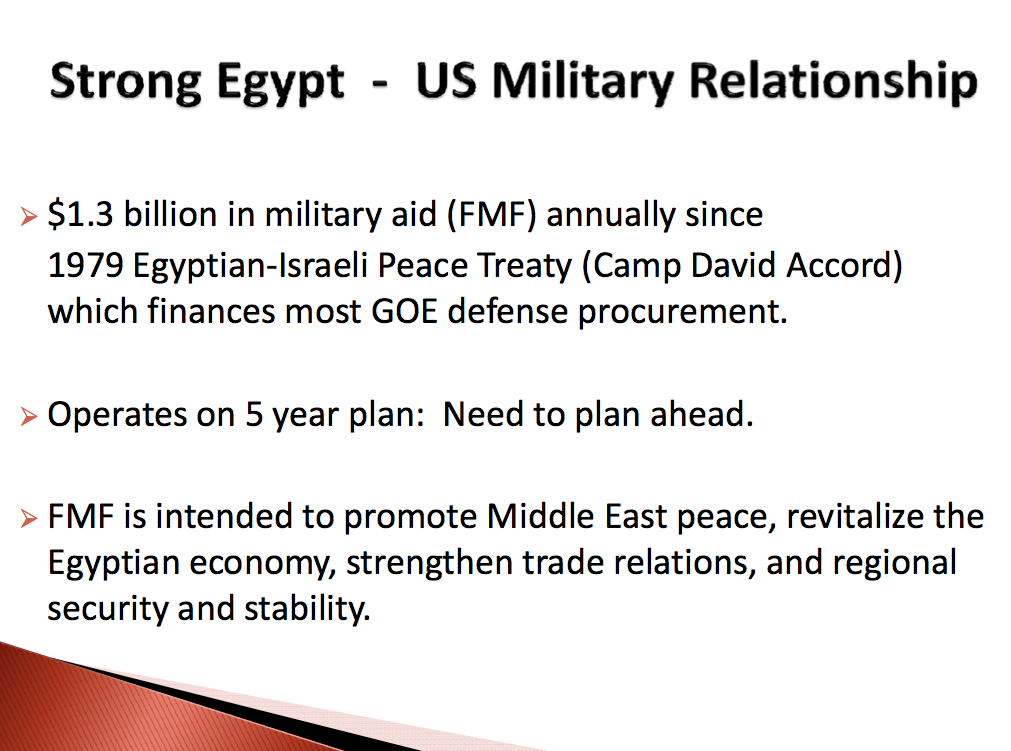
And the US Commercial Service provides crucial market research data to US firms. For instance, did you know that Egypt shares a border with the West Bank?
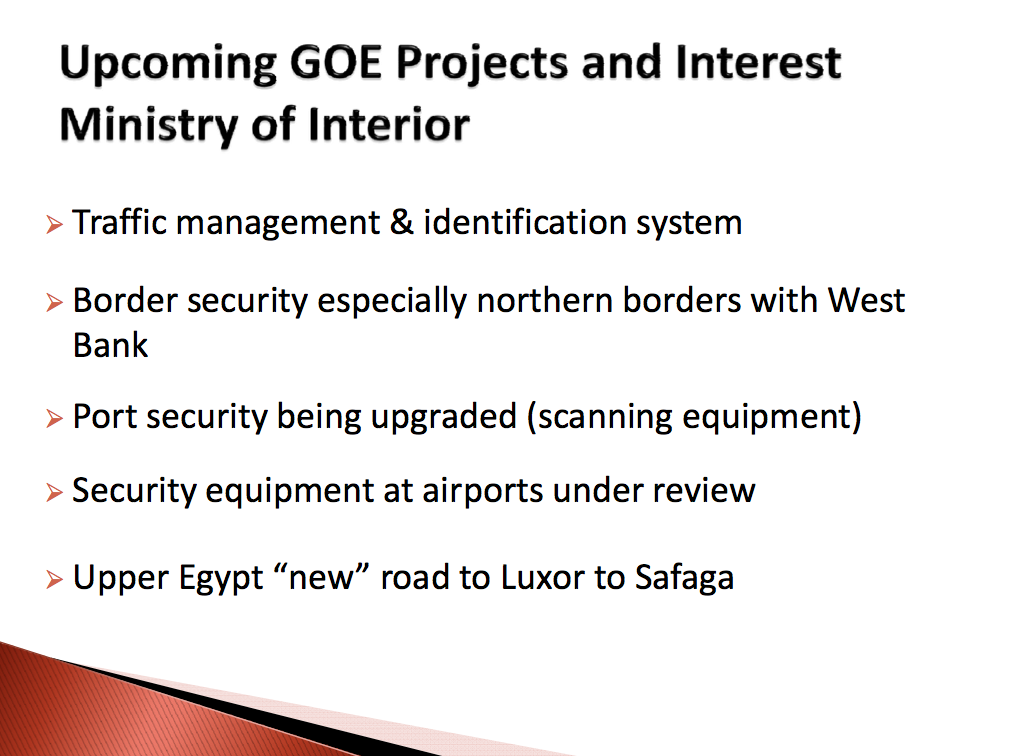
Since this presentation was created, US defense firms have continued to deliver weapons to Egypt and sign new contracts–all paid for with American tax dollars through the US Foreign Military Financing (FMF) program. In July 2011, as violence against demonstrators intensified and hundreds of thousands of protestors returned to Tahrir Square, the United States announced the eleventh installment of General Dynamics’ $1.3 billion M1A1 tank coproduction program. US officials recently confirmed that they will move ahead with the scheduled delivery of additional F-16 jets in fulfillment of a 2009 contract; that single contract includes equipment manufactured by eleven different US defense firms at seventeen individual production sites spread across eleven different US States.[3] The elected representatives of those states are critical voices in the debate over US military aid to Egypt–which often centers on American manufacturing jobs and the viability of production lines for particular weapons systems. The issue of how the military aid program impacts Egypt itself has been relegated to a rote script of phrases about achieving military “modernization”, “interoperability,” and securing the region’s “basic military balance.” But even these concepts are empty neologisms; US government auditors outside the defense establishment have criticized both the Department of Defense and the State Department for failing to back-up such claims with valid measures.
Whatever muted criticism of the aid program exists within Washington, the diplomatic salesmanship of the US Commercial Service and other government agencies is unlikely to disappear. Nor are the violent and undemocratic practices of the Egyptian military or major disturbances in domestic politics likely to derail the program. Because at its core, US military aid to Egypt is about subsidizing US defense firms and securing export markets–revolution or no revolution.
[1] Also see Robert Fisk., “US envoy`s business link to Egypt,” The Independent (UK), 7 February 2011,
http://www.independent.co.uk/news/world/americas/us-envoys-business-link-to-egypt-2206329.html
[2] Source: “Egypt: Export Opportunities in the Security & Defense Sectors.” US Department of Commerce. Presentation slides from US Embassy in Cairo: Commercial Section. Created 15 May 2011
[3] These states are California, Connecticut, Florida, Maryland, Massachusetts, Missouri, New York, Ohio, Virginia, and Washington State.